When Unable to Sleep: Top Tips
You are tired but can't fall asleep: every person has faced such a situation at least once. Few are those who can sleep without any problems constantly. Understandably, each person needs a different amount of sleep. We have nine tips for falling asleep for you! From breathing techniques and nutrition to tried and tested home remedies: if you can't sleep at night, we are here to help you.
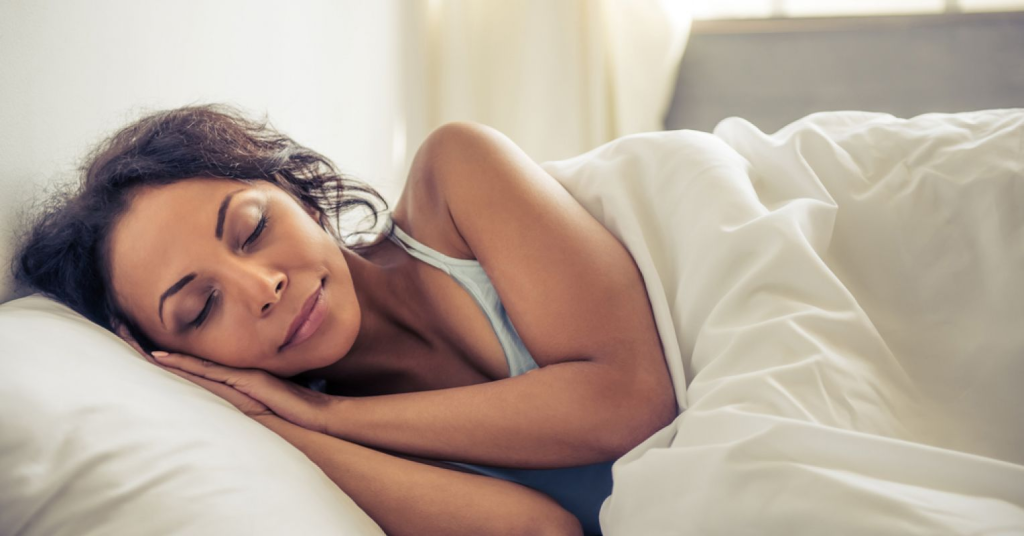
Tip 1: How to fall asleep when you're not tired?
Being awake all night long, even though you were looking forward to coming back to your bed all day – does that sound familiar to you? If so, the organism may not yet be set to sleep at the right time: that's why you are unable to fall asleep. Fixing insomnia is only possible with a constant daily rhythm: an important part of so-called sleep hygiene.
The first tips for how to get to sleep when you can't are, therefore:
-
Try to get up and go to bed at about the same time every day, even on weekends.
-
Don't go to bed until you're actually tired.
-
If you are often tired during the day, a short nap (10 to 20 minutes) is better than getting up late.
-
Avoid blue screen light, for example, from the smartphone at least one hour before sleeping. The light unbalances the "sleep hormone" melatonin because the body perceives it as daylight. This means that it wakes up the body again, even though it would actually be ready for sleep. It's one of the most common reasons why people can't sleep.
Maybe your body is long tired, and you just don't feel it yet. You need some time to get used to these tips.
Tip 2: Falling asleep when nervous or excited
The important presentation the next day, a big event, or something that happened during the day: as a result, you are too excited to fall asleep and can't go to sleep again. What now? Surprisingly, aromas can help if you can't sleep at all.
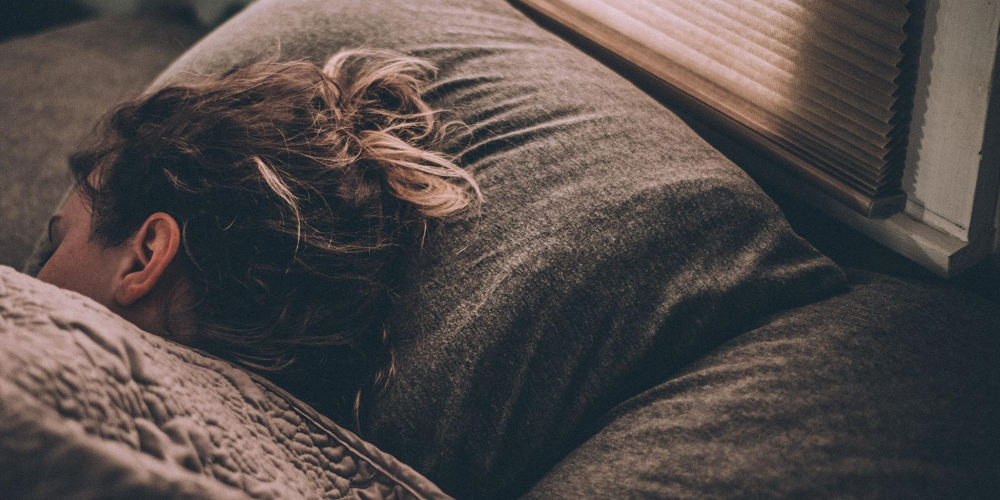
These fragrance aromas can have a relaxing effect:
-
Lavender: calms the thoughts after a stressful day at work.
-
Hops: is intended to help with stress-related headaches.
There are also some other herbs that can help in case I can't go to sleep. We'll discuss them a little bit later.
Tip 3: Falling asleep with too many thoughts in your head
As soon as you are in bed, thoughts like: "What if..." or "If only I had...".
Distraction and "clean up" your head are called for! These tricks can help if you can't sleep well due to your thoughts:
-
Try not to put pressure on yourself.
-
Trying to make yourself sleep only causes more stress, and you will end up lying and thinking, "how come I can't sleep?"
-
Get up again and try to write down a short list called "Why I can't sleep." It will help analyze possible reasons and get rid of them in the future.
-
Let your thoughts, worries, or even sudden ideas run wild. Anything you hold on to in writing can be banished from your head. Paper is patient!
-
Distract yourself, for example, with the well-known sheep counting. They don't necessarily have to be sheep – monotonous counting itself is important.
-
Try to incorporate relaxation exercises such as meditation into everyday life.
-
If you get used to meditating for 5-10 minutes every day, you can bring about the inner state of rest much faster in the evening.
Tip 4: Music and meditation to fall asleep
There is no one-of-a-kind meditation to fall asleep, but you can try many different methods. There are many instructions for falling asleep meditation on the Internet – so it's time to try it out!
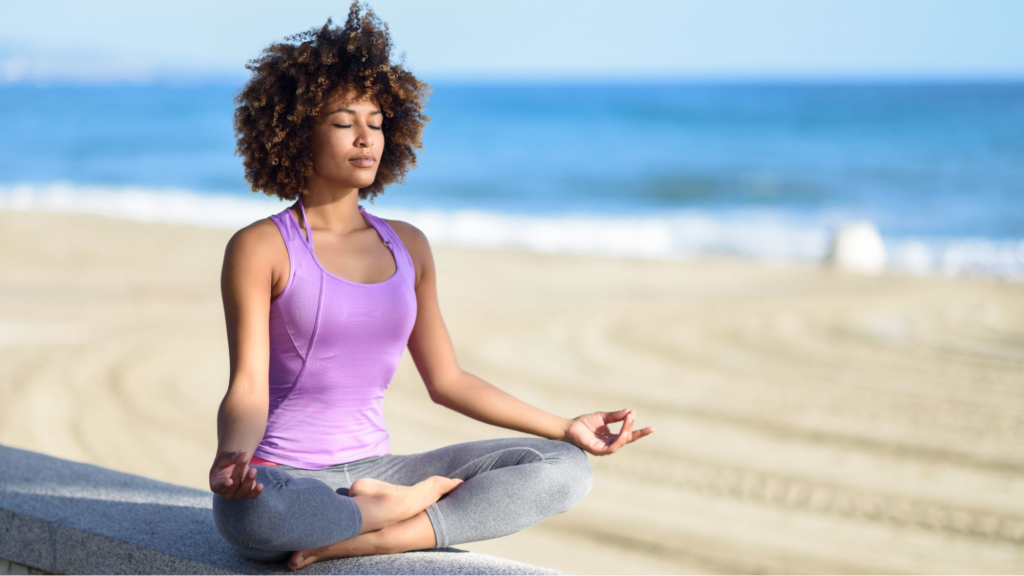
Is silent meditation still a bit difficult? Then perhaps a slight background noise will help, for example:
-
Sea noise, rain noise.
-
Relaxing music.
-
A soothing audiobook.
In the meantime, even the concept of a sleep podcast has established itself. ASMR (autonomous sensory meridian response) videos can also be really helpful: there, people produce different relaxing sounds and use visual triggers that can help you fall asleep really quickly. Authors of such videos say they know how to fall asleep when you can't.
Tip 5: Breathing techniques
Inhale, exhale – and fall asleep! Breathing techniques have proven themselves as sleep aids. The best known is the 4-7-8 technology.
Get to sleep within 60 seconds with this breathing technique:
-
Take a deep breath for 4 seconds.
-
Hold your breath relaxed for 7 seconds.
-
Exhale as evenly as possible for 8 seconds.
These steps can be repeated until you find yourself in the land of dreams.
The 4-7-8 method promises to fall asleep within a very short time. But how realistic is that? It usually takes between 5 and 20 minutes to fall asleep. Everyone has to test whether the combination of counting and breathing has an effect needed. Because what works for some may cause stress for others.
If this breathing technique does not have the desired effect even with a little practice, deep breathing may be the better solution: breathing in and out as evenly as possible. This is how you simulate sleep breathing and can "persuade" your body to fall asleep with a little skill! It may become your perfect answer to a question about what to do if u can't sleep.
Tip 6: What to do if you are afraid of not being able to sleep?
Are you going to bed with the fear of not being able to sleep? In such cases, the paradoxical intention, according to Viktor Frankl, can be a solution. Frankl's method is based on the idea that certain behavior is carried out intentionally, although you actually want to get rid of it.
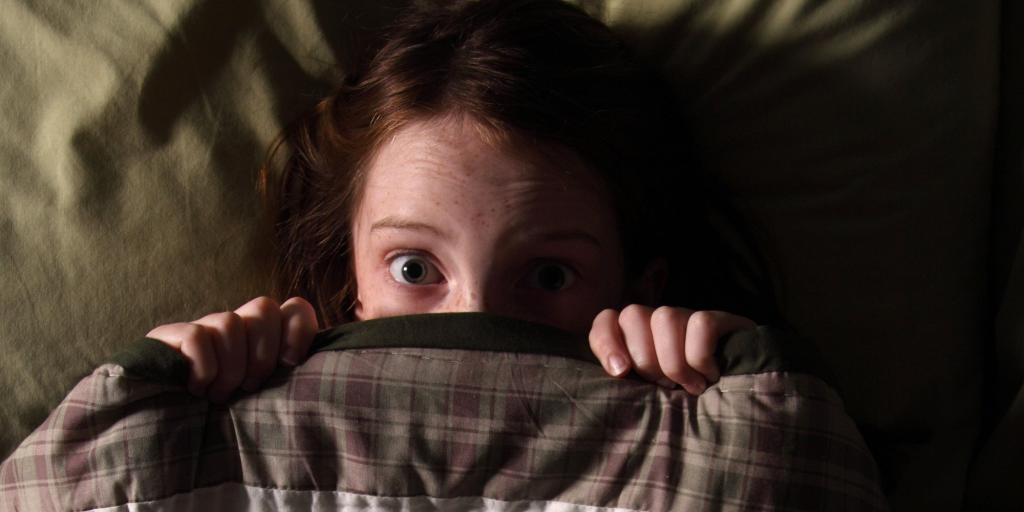
And how is that related to falling asleep problems? It's simple:
-
Lie down in bed and extinguish the light as if you were about to fall asleep.
-
Try to stay active and awake instead of consciously dealing with "how to sleep when you can't."
So you do exactly what you want to overcome in this procedure. Try it out! If that doesn't work, you can try self-hypnosis. What sounds strange at first should be mastered with a little practice: you can use either written instructions or audio formats.
Tip 7: Nutrition
Eating habits affect almost all areas of life and not least our sleep. Often, some culinary changes help to fall asleep better.

Insider tip: sleep better with magnesium
Magnesium makes the organism sleep better and prevents nocturnal muscle cramps. It is contained in many foods, including:
-
Wholemeal bread and noodles.
-
Millet.
-
Pumpkin seeds.
Eat properly before bed
What to do when u can't sleep? Eat properly! A full stomach doesn't let you sleep. Therefore, the last meal of the day should be light and take place at least 3 hours before bedtime. Thus, the intestine has already digested the food, which makes it easier to sleep peacefully.
If you do not manage to eat a few hours before bed due to time constraints, dinner should be as digestible as possible.
And another tip: do without alcohol before going to bed! Although it often ensures quick falling asleep, sleep is more restless.
Tip 8: Home remedies
It is not for nothing that the classic home remedies for falling asleep problems are still popular: Warm milk with honey or herbal tea before bedtime can be quickly prepared. The more you choose the good old home remedies, the better!
Hot milk with honey
Milk contains the sleep-promoting hormone melanin in very small quantities. It has not yet been scientifically proven that warm milk with honey can actually help you fall asleep.
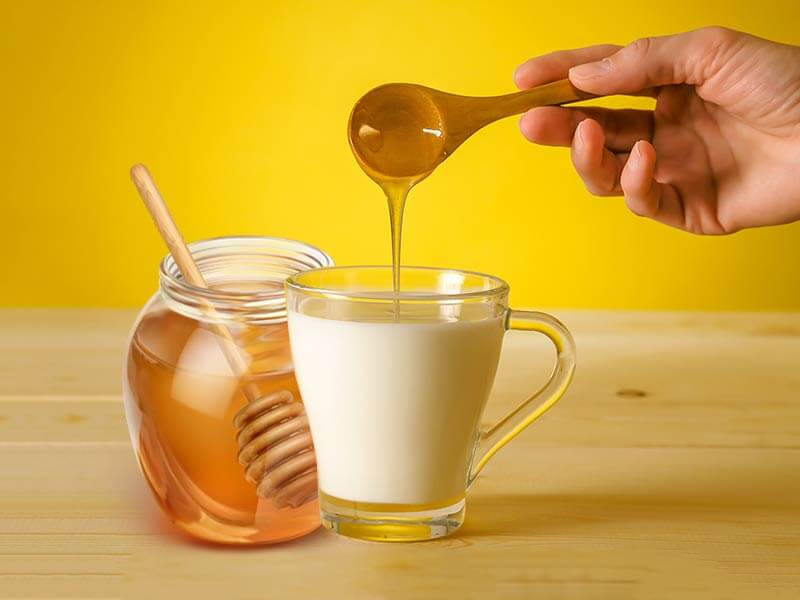
So is grandma's insider tip in vain? For psychological reasons alone, the delicious drink can have its effect – an attempt will not harm you.
What tea is good for falling asleep?
Tea is a particularly popular means of making it easier to fall asleep. Herbal tea varieties, in particular, are supposed to help you fall asleep faster. Here are some options:
-
Chamomile.
-
Lavender.
-
Lemon.
-
Valerian.
There are also special herbal tea mixtures. Try your taste of the different varieties – there is certainly something for your taste.
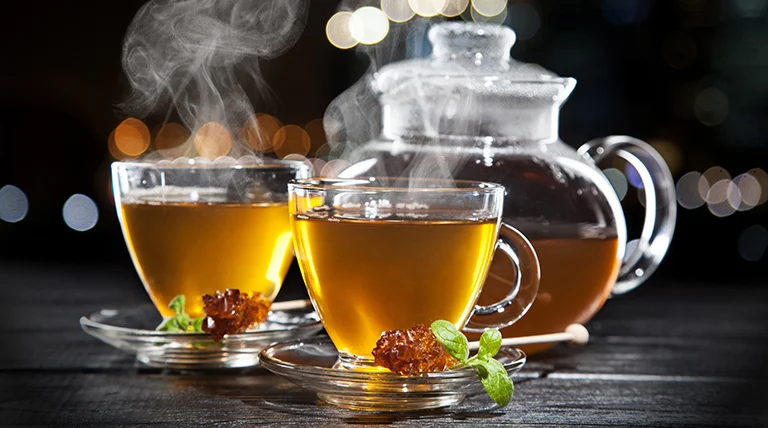
Apple cider vinegar before bed
Can a simple vinegar drink help you fall asleep? It does! It is said that vinegar has the following beneficial properties
-
It promotes digestion. A little apple cider vinegar in dinner can cause the food not to be so heavy in the stomach.
-
Helps against heartburn.
-
Fills you up and prevents cravings. If dinner takes place very early, you don't have to lie awake with a growling stomach but can simply help yourself with a glass of lukewarm water mixed with apple cider vinegar and, if necessary, some honey.
Tip 9: Suitable sleeping environment
It is best to sleep in a bedroom where you feel completely comfortable.
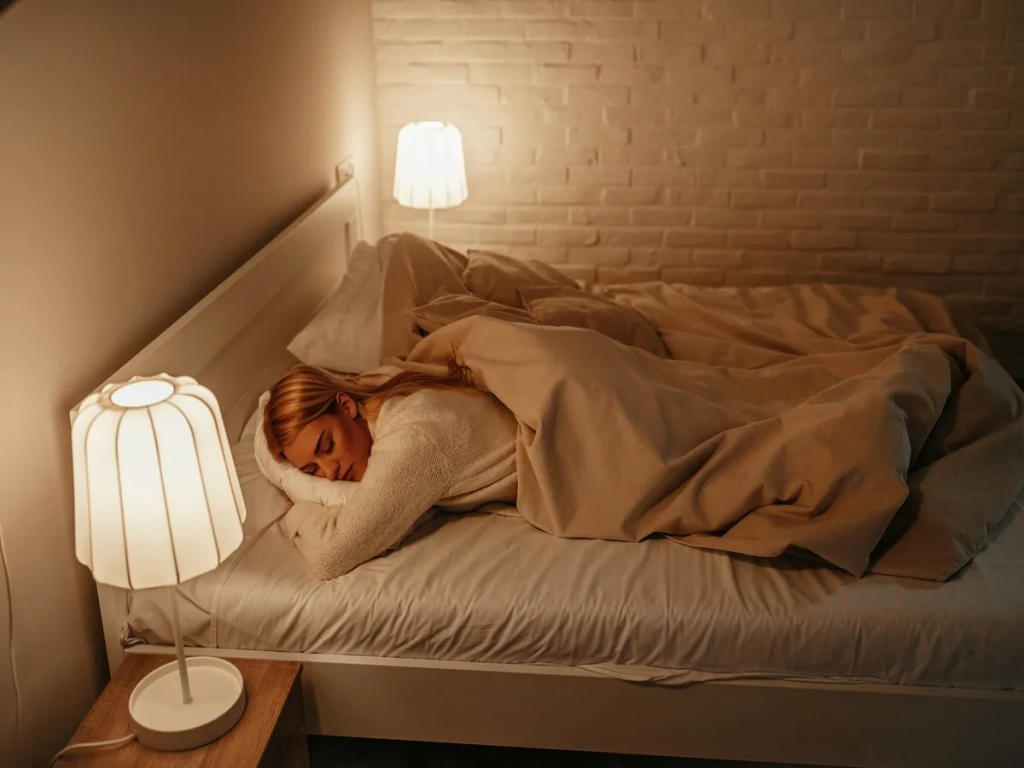
A comfortably furnished bedroom with solid wood furniture creates the best conditions to fall asleep peacefully. For example, rely on:
-
Natural materials for organic bedding and organic mattresses.
-
Soothing colors (on the wall, in decorative items, etc.).
-
Good darkening, in case of doubt, with a sleeping mask.
-
Warm light.
-
Regular ventilation and not too warm temperatures.
Tip 10: Pine scent
For centuries, the Swiss stone pine has been said to have a calming effect. People find the fresh scent of the forest very pleasant. When it rains outside, it is worth sleeping with the window open: the moisture unfolds the scent of Swiss stone pine even more strongly! For testing, you can place a pine bag on your nightstand and enjoy the scent of Swiss stone pine when you wake up and wake up. The Alpine pine wood absorbs moisture at night and releases it back into the air. So you always sleep in an optimal indoor climate! Other wood varieties are also useful: research the Internet for more.
Why is healthy sleep so important?
Our lives follow an inner clock. It depends on the change of day and night. Body functions and mental well-being adapt to this daily rhythm. This controls the body temperature and the release of hormones. Memory performance is also significantly dependent on a good night's sleep.
Medically, bad sleep is often called insomnia. Affected people have problems falling asleep, or they wake up several times a night and then fall asleep badly again. Older people complain more often about sleep disorders, and women are more likely to suffer from insomnia and a lack of restful sleep.
How much sleep does each person need? It varies individually. However, if you feel that you sleep too little, you risk illnesses and also obesity in the long run. In addition to releasing hormones responsible for our appetite, poor sleep also affects carbohydrate metabolism.
At the same time, sleep disorders are related to increased stress hormone levels, cardiac arrhythmias, and high blood pressure. This also increases the risk of heart attack and stroke. Even our immune system is affected if there is too little sleep. For you to have a better understanding of how to go to sleep when you can't, let's take a look at disorders that may cause it.
Sleep disorders: description
Almost everyone has short-term sleep problems over a few days at least once: in stressful phases of life, during an illness, or due to stressful situations. They are usually harmless.
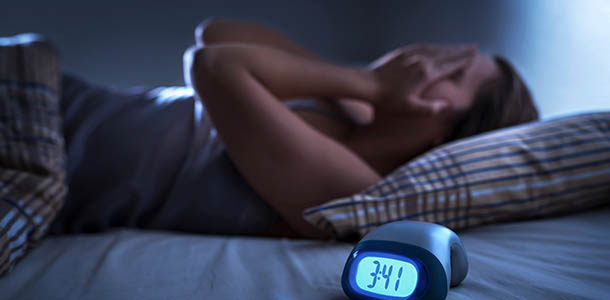
They are different from "real" sleep disorders. These are sleep problems that occur over a longer period (from three to four weeks) and significantly affect the performance of the person concerned. They can be both physical and psychological. Therefore, you should have the cause clarified.
Sleep disorders are widespread and not trifle. Chronic sleep disorders, in particular, can severely limit the daily condition and performance of the person concerned, impair his social competence and lead to accidents.
Sleep disorders: how do they manifest themselves?
What to do when can't fall asleep? You already know lots of options. But we are not yet familiar with possible reasons: disorders you may suffer from.
Experts distinguish more than 80 different sleep disorders, which can be divided into eight main groups according to the type of complaints:
-
Insomnia: This includes sleep disorders, sleep disorders, early morning awakening, and chronically unrecoverable sleep. In addition, those affected complain, for example, of fatigue, attention or memory problems, mood impairment, tension, headaches, and/or worries about the sleep disorder. Insomnia is one of the most common forms of sleep disorder. It can, for example, be caused by psychological stress ( for example, financial worries) or drug abuse (such as excessive use of sleeping pills).
-
Sleep-related breathing disorders: they include various forms of sleep apnea. This leads to nocturnal breathing interruptions, so breathing pauses for a short time, which is often unnoticed by the sleeping person.
-
Hypersomnia of central nervous origin: In these sleep disorders, those affected primarily suffer from excessive drowsiness during the day, although the nocturnal amount of sleep is not reduced, and there is no circadian rhythm disorder (i.e., a disorder of the individual day-night rhythm). Hypersomnia includes, for example, narcolepsy as well as daytime sleepiness due to traumatic brain damage or as a result of drug or substance abuse.
-
Circadian sleep-wake rhythm disorders: such rhythm sleep disorders can be triggered, for example, by time zone changes (jet lag), shift work, organic diseases, or drug abuse. They lead to insomnia and massive daytime sleepiness.
-
Parasomnia: these are episodic interruptions of sleep due to unusual physical phenomena or behaviors such as sleepwalking, nocturnal nightmares, nocturnal moaning, sleep-related eating disorder, or repeated, unconscious bladder emptying during sleep.
-
Sleep-related movement disorders: Sleep disorders are caused here by simple, usually stereotypical movements. A common sleep-related movement disorder is Restless Legs Syndrome (RLS). Other sleep disorders in this category are, for example, periodic movement disorders of the limbs and nocturnal teeth grinding.
-
Isolated symptoms, standard variants, unsolved problems: this category includes all sleep-related symptoms that are at the border between "normal" and pathological processes, or that cannot yet be clearly classified as normal or pathological from a scientific point of view. Examples: short sleepers (need less than five hours of sleep per 24 hours), late risers (usually need more than ten to twelve hours of sleep per 24 hours) as well as strong, repeated muscle twitches when falling asleep. Snoring and speaking during sleep are also assigned to this category, although they usually do not disturb the sleep of the person concerned.
-
Other sleep disorders: this refers to all sleep disorders that cannot be assigned to any of the other categories, for example, because they have not yet been sufficiently studied or have characteristics of different categories of sleep disorders.
Rules for a restful sleep
What can you do when you can't sleep? You already know a lot, but we have something to add and summarize what we already mentioned.
Two-thirds of all sleep disorders can be improved with non-drug measures. This includes, above all, good sleep hygiene. It includes the following rules:
-
Don't sleep more than your body needs. This is especially important for the elderly.
-
Get used to regular bedtimes.
-
Do not take a nap during the day (midday nap).
-
Ensure pleasant sleeping conditions. This also includes the right bedroom temperature (about 18 °C is optimal).
-
Do not drink alcohol or coffee in the evening – both have a stimulant effect. If you are sensitive to caffeine, you should refrain from doing so from noon. This also applies to cola, energy drinks, and cocoa.
-
Pay attention to a balanced diet and regular physical training. If you only eat fast food and can call yourself a couch potato, don't be surprised about sleep disorders.
-
Ensure a relaxing evening arrangement that slowly ends the day. Strenuous fitness training in the evening or an exciting thriller for evening reading, on the other hand, can cause disorders as well.
Plants can help
Various home remedies for sleep disorders may also be able to help you.

There are various medicinal plants that can help with sleep disorders. They are mainly used as tea:
-
Valerian: valerian is the medicinal plant of choice for falling asleep disorders. It has a calming but non-anesthetic effect, like chemical sleeping pills. For disorders caused, for example, nervousness, inner restlessness, or too much coffee, a tea from valerian root can help. In case of chronic sleep disorders, you should drink several cups throughout the day. If you don't like the somewhat unpleasant valerian taste, you can reach for tasteless valerian dragees, capsules, or tablets.
-
Hops: it can enhance the calming effect of valerian because a highly soothing active ingredient forms in the hop cones during storage. You can use hops in tea form or make yourself a sleeping pillow: put hop cones in a cotton pillow and sleep on it. After a week, replace the hop cones.
-
Melissa: melissa is a well-known plant from monastic medicine. Melissa leaves and lemon balm oil have a calming effect. Melissa oil is quite expensive, so you can use lemon balm leaves as a substitute. You should drink several cups of lemon balm leaf tea throughout the day.
-
Lavender: it has long been appreciated for its soothing and sleep-promoting effect. Drink two cups of lavender blossom tea before going to bed.
-
Passionflower: this medicinal plant can help with mild forms of nervous restlessness, sleep disorders, and heart problems. It has a heart-strengthening, calming, and antispasmodic effect. Passionflower herb can be found in tea blends together with other soothing and relaxing medicinal plants such as lavender and valerian.
Conclusion
A good rest is one of the key elements of one's success and well-being. Now you know how to improve its quality. Hopefully, you have found the answers you've been looking for in our article. Let your night's rest be maximally enjoyable!